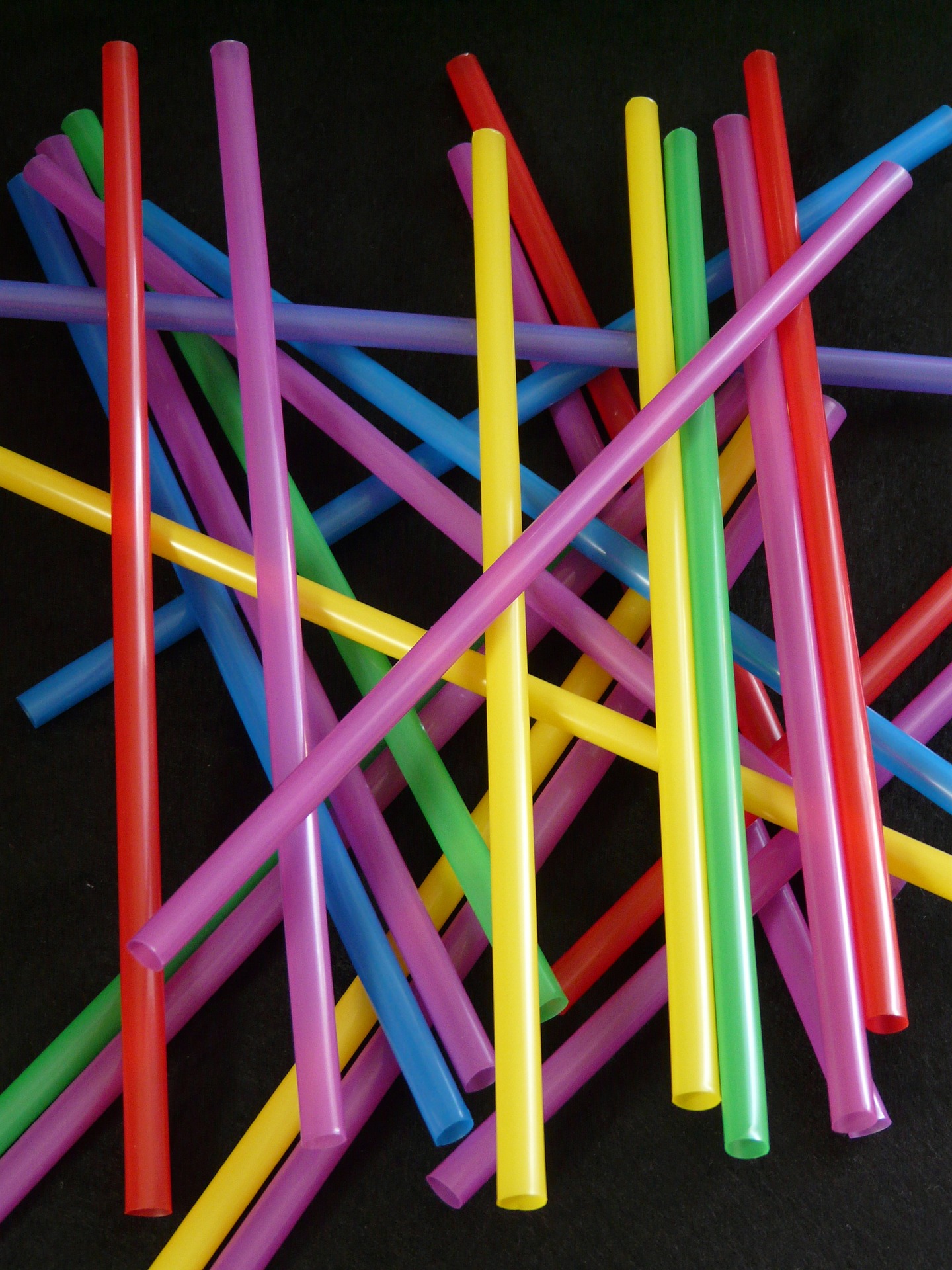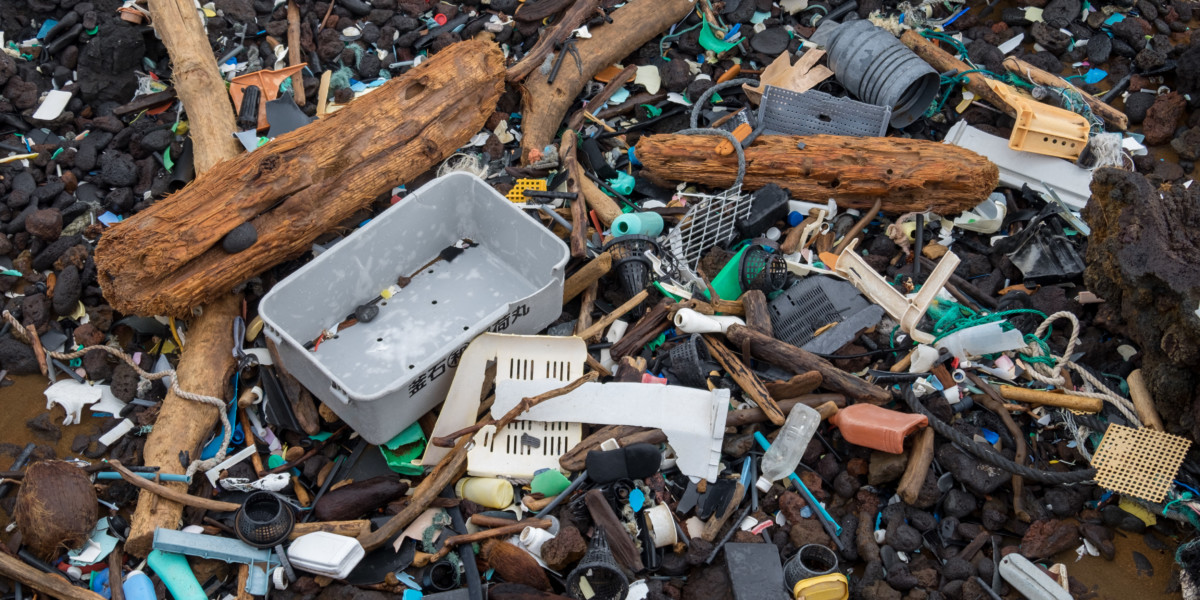![Trash from the Great Pacific Garbage Patch that washed up in Hawaii. By Justin Dolske from Cupertino, USA (Beach trash) [CC BY-SA 2.0 (https://creativecommons.org/licenses/by-sa/2.0)], via Wikimedia Commons](https://hiehelpcenter.org/wp-content/uploads/2018/08/Great-Pacific-Garbage-Patch.jpg)
By Justin Dolske from Cupertino, USA (Beach trash) [CC BY-SA 2.0 (https://creativecommons.org/licenses/by-sa/2.0)], via Wikimedia Commons
Many plastics accumulate in subtropical waters between California and Hawaii; this 1.6 million km² area is termed the Great Pacific Garbage Patch, and holds approximately 79,000 tons of plastic. If we continue discarding plastic products at the rate we currently are, scientists predict that by 2050, there will be more plastic in the oceans than fish.
Why straw bans?
Even though straws are not one of the biggest contributors to plastic waste, they are a good target for change because most people would find it easy to avoid using them. After that, reducing or eliminating other single-use plastic items may seem less overwhelming.
It is not that lofty a goal: many cities and countries have already banned single-use plastic products such as grocery bags, bottles, forks, spoons, and knives. Environmental advocates have since been pushing for bans on disposable plastic straws. Advocates hope that the ban either would be implemented by individual restaurant chains/businesses who choose to participate, or on a broader level, such as a city or state-wide straw ban.
As Dune Ives, the executive director of Lonely Whale (which led a movement called “Strawless in Seattle”) told Vox, “our straw campaign is not really about straws. It’s about pointing out how prevalent single-use plastics are in our lives, putting up a mirror to hold us accountable. We’ve been asleep at the wheel.”
How could straw bans affect people with disabilities?
For most people, plastic straws are an unnecessary luxury. However, many people with disabilities require straws in order to safely drink anything. This may be due to difficulty lifting cups, spastic movements, swallowing disorders, or a variety of other issues.
In lieu of disposable plastic straws, some people with disabilities are able to use more environmentally-friendly types, such as paper straws, biodegradable plastic straws, or reusable metal straws. However, these options do not work for everyone. Paper and other biodegradable materials can fall apart while the user is drinking. In addition to being inconvenient, straw disintegration can also increase the risk of choking. Likewise, reusable metal straws can be too inflexible for people with motor impairments, and can be difficult for people with certain disabilities to wash.
Some straw ban supporters have posed the question of what people with disabilities did before plastic straws were invented. As Shaun Bickley, co-chair of the Seattle Commission for People with DisAbilities, explained to NPR, “they aspirated liquid into their lungs, developed pneumonia, and died.”
The ability to participate in society (which includes eating out and going to coffee shops) with minimal barriers or risks is a fundamental right. In a piece for The Washington Post, Karin Hitselberger writes that, “living with a disability takes a lot of planning and energy and learning how to exist in a world that is not made for you. I’d rather not add, ‘Will they have a straw?’ to my list of worries every time I go out for a cup of tea.”
How can we protect the environment without infringing on disability rights?
When Starbucks announced its intention to eliminate all plastic straws, disability rights advocates planned to protest outside a Starbucks in New York City. Starbucks responded with a statement that they would continue to keep plastic straws available for anyone who requires them. Additionally, Starbucks told Time Magazine that they plan “to focus on inclusive design to ensure that all customers will be able to enjoy their Starbucks beverages.”
Some state governments have taken a similar approach. For example, Seattle has a new plastic straw ban, but it includes a waiver allowing restaurants to provide plastic straws to customers who would struggle to drink without them. Unfortunately, it appears that some restaurants are no longer bothering to stock straws at all. Bickley told NPR that he asked over a dozen chains in Seattle whether they had plastic straws available for those with disabilities, and they did not.
Available measures to prevent disabled people from consequences of ill-considered straw bans
1. Have straws available upon request
Businesses should still provide plastic straws to those who need them. As is the case with other disability accommodations (i.e. service dogs), this should not require the customer to prove they have a disability. To avoid regular invasions of privacy, they should simply be available upon request.
2. Any government-mandated bans must include exemptions
Governments implementing bans should include disability exemptions in their legislation, and make sure business owners are aware of these exemptions.
3. Work towards better plastic straw alternatives
Environmental groups should acknowledge that the biodegradable and reusable options which are currently available do not work for all people with disabilities. More attention should be focused on creating environmentally-friendly straws with similar qualities to the single-use plastic ones.
Hitselberger also emphasizes the need for compromise, noting that “we don’t have to choose between making the world more sustainable or making it more accessible. With a bit of creative thinking, we can achieve both.”
Sources:
- Vox: Why Starbucks, Disney and the EU are all shunning plastic straws
- Nature.com: Evidence that the Great Pacific Garbage Patch is rapidly accumulating plastic
- 16 Times Countries and Cities Have Banned Single-Use Plastics
- NPR: Why People With Disabilities Want Bans On Plastic Straws To Be More Flexible
- TIME: Disability Advocates Speak Out Against Plastic Straw Ban
- Washington Post: Plastic straw bans are the latest policy to forget the disability community
- WWF Australia: The Life Cycle of Plastic


Leave a Reply
You must be logged in to post a comment.